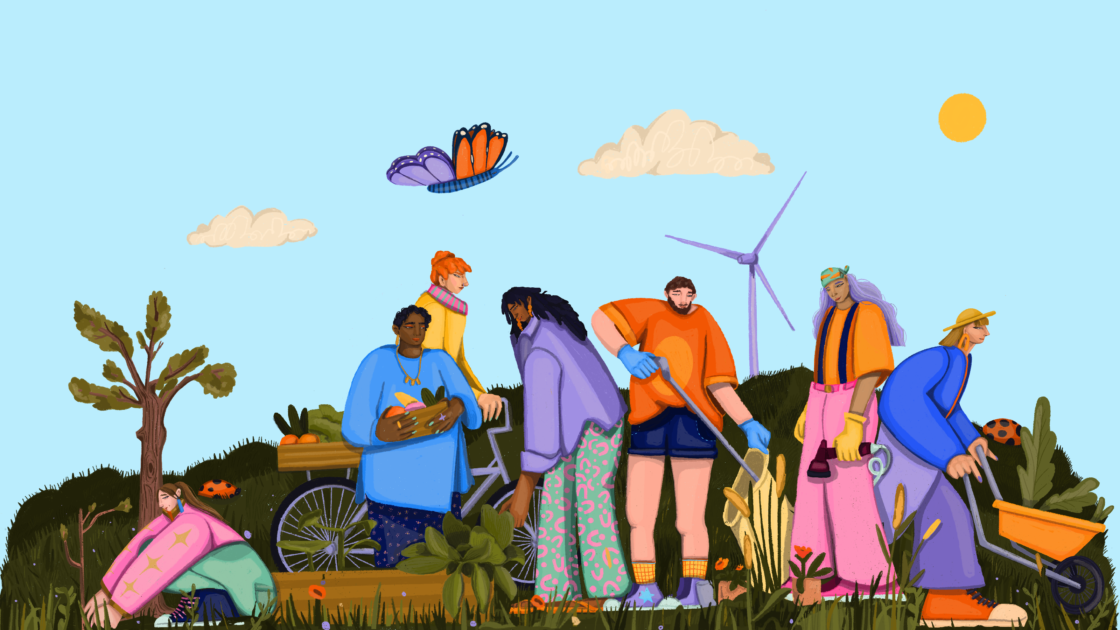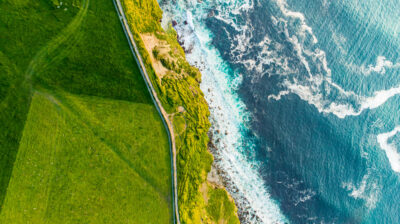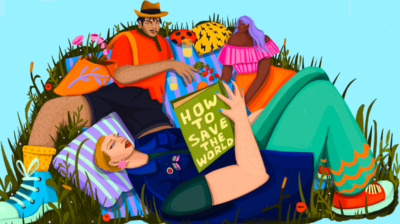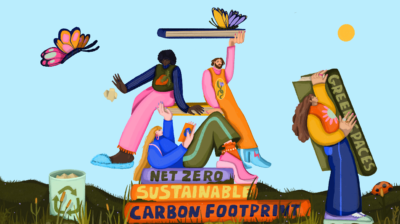What is a just transition?
It important that the pathway we take towards a greener future leaves no one behind. Learn more about a just transition.

Ireland’s climate policy sets us on a path to net zero emissions by 2050. Reaching net zero emissions means that the amount of greenhouse gases we release into the atmosphere is balanced or exceeded by the amount of greenhouse gases removed from the atmosphere.
Achieving this goal is essential to minimising global warming and the devastating effects of the climate crisis. In Ireland, achieving net zero emissions will require a rapid transformation of all aspects of the economy and society. A transition of this scale and speed will see industries, livelihoods and regions experience many changes. It is important that the pathway we take towards net zero emissions leaves no one behind. In climate policy, a fair and inclusive pathway towards a sustainable future is referred to as a ‘just transition’.
What is a just transition?
Achieving a just transition is a key aim of climate justice. Climate justice is an idea for a fair society where both the burdens and benefits of addressing climate change are shared equally.
Despite global efforts to move towards cleaner forms of energy, our world is still very dependent on fossil fuels. Fossil fuels power our industry, heat and provide electricity to our homes and businesses. Our economies rely on taking resources from the earth and maximising profits with little thought to the long-term damage we are causing to the planet. There is widespread international agreement that we must move from this unsustainable model towards a circular economy model. A circular economy is one where products are designed to create less waste, be longer lasting, reused, and produce few emissions.
The climate policies that targets high-emitting sectors (such as agriculture, energy or transport) can put people’s livelihoods and futures at risk. It can also unintentionally deepen inequalities between different communities by making some take on more of the burden than others. For example, a carbon tax on fossil fuels raises the price of coal, oil and gas. This puts financial pressure on low-income households who cannot afford to move to cleaner energy use.
The question just transition approaches try to answer is “How do we make the necessary changes to protect the climate in a way that is fair and inclusive of everyone, while also attacking pre-existing inequalities?”.
How can a government create a just transition?
For a government, building a just transition means providing supports for individuals and communities impacted by the move towards a sustainable future. It also means making sure everyone impacted has a say on what these supports are. Every community affected is different, so the government support provided should be based on their unique needs and situations. For example, cattle farmers will need specific funding to reduce their levels of greenhouse gas emissions. Likewise, workers affected by factory closures require support to find new employment or training opportunities.
International climate policy often includes support for a just transition. The Paris Climate Agreement calls on countries to respond to the urgent need for a just transition in order to protect workers and communities. The European Union (EU) has established a Just Transition Fund to support high-emitting regions that will be most impacted by the transition.
How is Ireland transitioning towards net zero emissions?
Here are some of the actions currently being taken in Ireland to transition towards a sustainable future:
- Upgrading the energy efficiency levels of homes and offices (also known as retrofitting). This makes sure our buildings are less reliant on oil and gas and combats energy poverty
- Promoting sustainable modes of travel by improving public and active transport and redesigning streets to be more pedestrian or cyclist-friendly
- Adapting farming practices to reduce emissions and enhance biodiversity
- Bringing an end to peat extraction for power generation in the Midlands
Climate actions like these bring much-needed change. However, if they are made without the participation of the communities or sectors that will be impacted, they may create disadvantage and deepen pre-existing inequalities.
Who will be affected by Ireland’s climate transition?
In Ireland, the people who are likely to be most affected by the transition include those employed in the transport, energy and agricultural sectors. Rural communities will face different challenges compared to urban communities. This is due to differences in education, income, housing, health and transport options.
Groups who already experience inequality may face further disadvantage brought on by the transition if decision-makers do not take their needs into account. These groups include Travellers, people with disabilities, migrants, refugees, people from low-income backgrounds, young people and the elderly.
Working towards a just transition will pose different challenges for every country, region and community. It is the government’s responsibility to create policy that distributes the burdens and benefits of climate action fairly.
What is the Government doing to ensure a just transition?
In 2021, the Irish Government established the Just Transition Framework. In the Framework, four principles guide the transition towards net zero emissions:
Principle 1: Respond to Just Transition needs as they emerge
This includes the setting up of a Just Transition Commission. The Just Transition Commission will advise the Government on the social impacts of climate policy.
Principle 2: Equip people with the skills to participate in and benefit from the future net zero economy
A sustainable economy can bring many new jobs, for example, in renewable energy or climate science. The government should fund training, learning and re-skilling opportunities. The government should also support individuals whose employment opportunities have been impacted by the transition.
Principle 3: The costs of climate action are shared so that the impact is equal between everyone and pre-existing inequalities are not worsened
Climate policy should protect the most vulnerable, not create further disadvantage.
Principle 4: Empower impacted citizens and communities through social dialogue
It is essential to the just transition process that those impacted are part of the conversation on climate policies and impacts.
Here are some of the ways the Irish Government is implementing the Just Transition Framework:
- Setting up the National Dialogue on Climate Action (NDCA) programme to encourage the Irish public to have their say on climate action across the country
- Providing funding for lower-income households to participate in schemes to update their home’s energy efficiency
- Using revenue generated from carbon tax for targeted social supports to prevent energy poverty
- Supporting communities and businesses impacted by the decision to end peat extraction in the Midlands region
What can we do?
We are making progress towards a just transition in Ireland. However, we still have a lot to do to make sure the cost of climate action is shared equally amongst everyone. Achieving a just transition is something we can all take part in. We can use our voices to demand meaningful and fair climate policy from the government.
Learn more about how you can take action for the climate:
- How to get involved in climate activism in Ireland
- Climate action groups for young people in Ireland
- How to take climate action in your local community
Feeling overwhelmed and want to talk to someone?
- Get anonymous support 24/7 with our text message support service
- Connect with a trained volunteer who will listen to you, and help you to move forward feeling better
- Whatsapp us now or free-text SPUNOUT to 50808 to begin.
- Find out more about our text message support service
If you are a customer of the 48 or An Post network or cannot get through using the ‘50808’ short code please text HELLO to 086 1800 280 (standard message rates may apply). Some smaller networks do not support short codes like ‘50808’.






